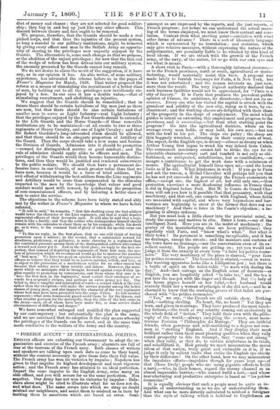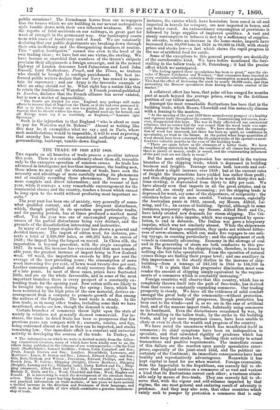"FOREIGN ACCENT" IN INTERNATIONAL POLITICS.
ENGLISH officers are exhorting our Government to adopt the or- ganization and exercise of the Freneh army ; alarmists are full of fear at the increase of the French a navy. Both classes of writers and speakers are talking upon such data as come to their hand, without the context necessary to give those data their full value. The French army has won its victories by impulse ; Napoleon has given to that impulse its highest development and most vigorous action ; and the French army has attained to an ideal perfection. Impart the same impulse to the English Army, cries many an able officer' and you will secure for us the same perfection. Non sequitur. Our Army has not won its victories by impulse : Bala- clava alone might be cited to illustrate what for us does not do, and what does. The same errors into which we stray no doubt mislead, our neighbours, and assist them to mislead us in turn by inciting them to assertions which are based on error. Some
amongst us are impressed by the reports, and the just reports, of French progress ; yet before we can understand the actual mean- ing of the terms employed, we must know their context and core- lation. Context from what starting point—eorelation with what other forms of advance ? There is a sort of ideomatic language which is surmounted by no translation ; and statistics, which only give relative measures, without expressing the nature of the subjectmatter, are peculiarly liable to be vitiated by this kind of local ideom. If we are struck 'with the growth of the French army, of the navy, of the nation, let us go with our own eyes and see what it means.
A short visit to Paris,—with a thoroughly informed cicerone,— or to the French provinces north or south, agricultural or manu- facturing, would materially assist this view. A proposal was made lately to furnish tramways for Paris, a la New York, but it was not entertained ; and the reason interests us, just now, more than the result. The very highest authority declared that such business facilities would not be appreciated, for "Paris is a city of luxury." It is Paris that produces the prevalent public opinion of France, its ambitions, its directorate,—but not its re- sources. Every one who has visited the capital is struck with the grandeur and solidity of the new city, rising as it were, by en- chantment; and the working classes are delighted with their share of the prosperity in the shape of employment. The mind which guides is intent on extending this employment and progress to the provinces, and is suceeeding,—but from what starting point the progress ? Go into the agricultural districts, where on the average every man holds, or may hold, his own sere,—but not with the fowl in his pot. The crops are paltry ; the sheep are thin beggarly wretches shivering in their scanty coats of wool. The aspect, to the English eye is dreary—altnest as dreary as when Arthur Young first began to wend his way inland from Calais. The commonest machinery cannot fail to strike the eye for its miserable character—every cart and tumbril is not only so old- fashioned, so antiquated, antediluvian, but so tumbledown,--so meagre a contrivance to get the work done with a minimum of means. The agriculturist himself lives upon air —and the horse looks as if he did. What hindrance in work ! If you go to Paris and ask the reason, a Michel Chevalier will perhaps tell you that he has not yet succeeded in persuading the French economists in office,—except one, the highest of all, but still only one,—that protection exercises a more deadening influence in France than it did in England before Peel. But M. le Comte de Grand Cha- teau will ask you how is it possible that that peasantry, with that machinery, and that soil, can compete with England, whose fields arc measured with capital, and whose very haymakers and har- vestmen are beginning to sneer at the farmer that does no use machinery ? And there is force in the Comte's objection ; a be- ginning is always arduous. But you must look a little closer into the provincial mind, to study the causes and motives in situ. Enter a town,—say of the intelligent Nord. Here you are in the midst of machinery ; the gentry of the manufacturing class are keen politicians ; they regularly visit Paris, and "know what's what." But what is their town ? Its pavement is something inexplicable, and it has no drainage, except the streets ; and the manners and customs of the town have no drainage,—nor the conversation even of its ex- cellent society. The people are getting on ; yet you would nob judge it from the anxiety at every turn "a faire lea petites econo- mies." The very machinery of the place is starved, "pour faire lea petites economies." The household is stinted,—even in water. The washing apparatus looks like a Lilliputian jest ; but there is a bottle of spirit on the toilet-table "to wash with during the day." And—last outrage on the English sense of decorum—as English, you are hospitably asked "to take tea," and the tea is put into the tea-pot with the finger ani thumb. But the lady of the house piques herself on her toilet,—her husband would scarcely think her a woman of principle if she did not,—and he is charmed to know that the crowning graces of that toilet are pur- chased with " les petites economies."
"Yes," we cry, "the French are all outside show. Nothing solid,—nothing sterling. No heart, Sir, no heart !" Yet they are born, and given in marriage. They have produced the most touch-
fictions,—the truth of any country coming out exclusively- in the whole field of "fiction." They hold their own with the philo- sophy of the world,—always excepting the newest, most mere- tricious Parisian "Philosophic du Manage." They are faithful friends, often generous and self-sacrificing to a degree not com- mon in " sterling " England. And if they display their most brilliant rather than their most pleasing qualities when they rally round prosperity to fête its triumph, they "come out strong " when they rally, as they do, to sustain misfortune in its trials, and rehabilitate it. How grossly we must misconstrue the moral idiom of that nation, truly great and estimable as it is, if we judge it only by salient traits that strike the English eye chiefly by their difference ! On the other hand, how we may misconstrue the impulsive efforts—impulsive though for years kept up—of that (those lively) people who are using gigantic efforts to build a navy,—who, in their homes regard the stormy channel as an almost impassable barrier,—who cannot build a cart,—and whose manufacturing and productive enterprise is based on "lea petite, economies!"
It is equally obvious that such a people must be quite as in- capable of understanding us as we are of understanding them. And what can be more directly calculated to mislead a foreigner than the style of talking which is habitual to Englishmen on
public occasions ? The Frenchman learns from our newspapers that the houses which we are building in our newest metropolitan style tumble down with their own inherent weakness. He sees the reports of fatal accidents on our railways, in great part for want of strength in the permenant way. Our bankruptcy courts teem with eases of insolvency and of fraud. We are constantly declaring that our public departments are breaking down through their own inefficiency and the disorganizing deadness of routine. This "nation boutiquiere " cannot rise even to the level of its own trading ideas ; we have lost our one virtue, the sterling. We have became so anarchial that numbers of the Queen's subjects proclaim their allegiance to a foreign sovereign, and in the newest highway of London denounce Lord Palmerston and Lord John Russell, Lord Shaftesbury, Punch, and the Times, as traitors who should be brought to condign punishment. The best in- formed public writers declare that our Navy has ceased to main- tain its supremacy ; and our Army is the favourite example of what an army should not be. What right has a nation like this to retain the traditions of Waterloo? A French journal published in London, declares that the French alliance has never existed, but is now a matter of impossibility.
"The hearts are divided for ever. England may perhaps still make efforts to recover that of Napoleon the Third, as if she had ever possessed it. But as to him, his wrongs are now too patent, his projects too far ad- vanced, that he should retrace his steps. England must say for herself, and all Europe must say it as resolutely as England,—" Lasciate ogin Speranza."
Such is the injunction to that England "who is about so soon to pay for Waterloo and St. Helena!" Absurd as writing like this may be, it exemplifies what we say ; and in Paris, where such manifestations would be impossible, it will be read as proving that anarchy has become the constituted authority of corrupt, gormandizing, bankrupt, tumble-down England.



























 Previous page
Previous page